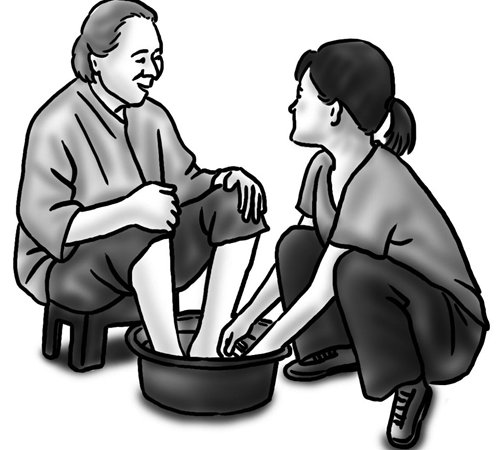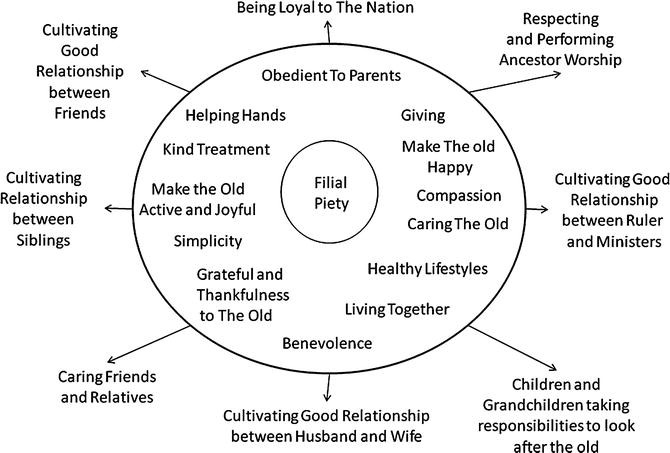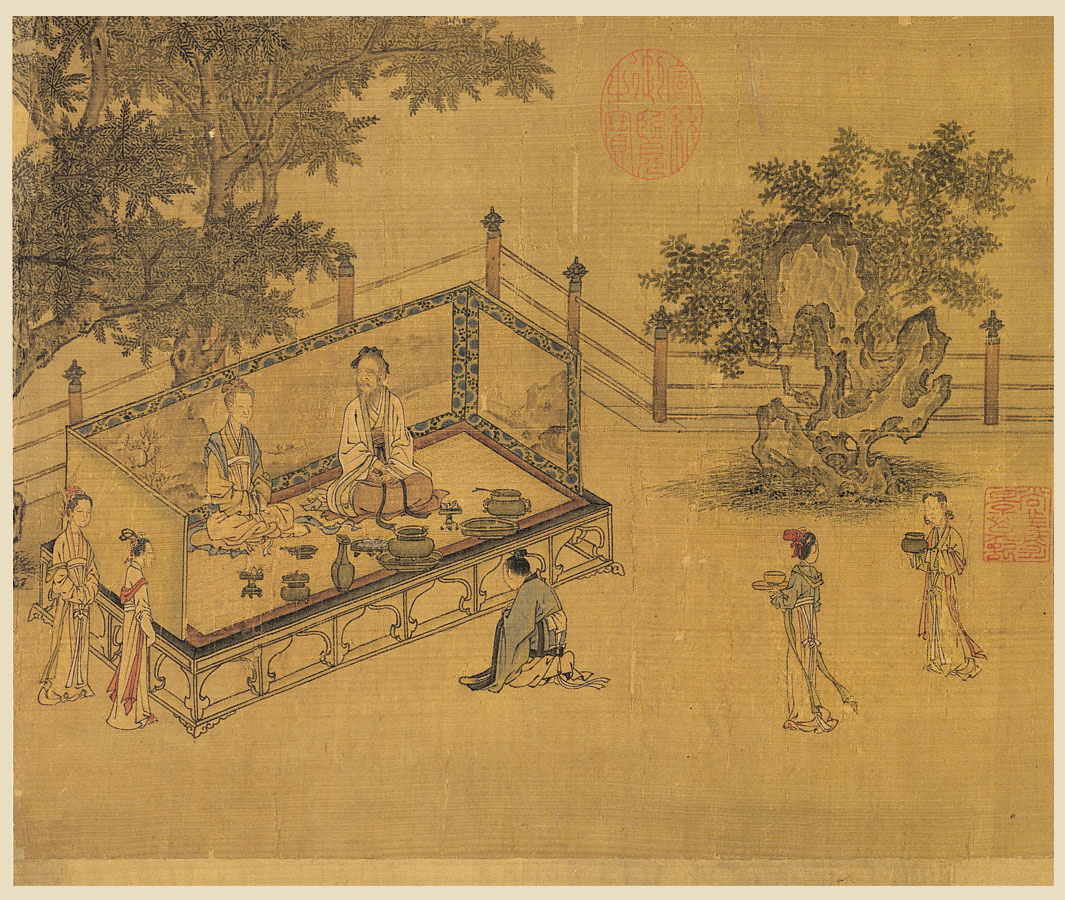Your Filial piety in western culture images are available in this site. Filial piety in western culture are a topic that is being searched for and liked by netizens today. You can Get the Filial piety in western culture files here. Download all free images.
If you’re searching for filial piety in western culture pictures information linked to the filial piety in western culture topic, you have visit the ideal site. Our site always provides you with suggestions for refferencing the highest quality video and image content, please kindly hunt and locate more enlightening video content and images that match your interests.
Filial Piety In Western Culture. It is the first and most important virtue in Chinese culture and has been referred to by historian Hugh DR. Although filial piety is not as common in modern Western culture the idea has emerged in psychological studies. For Confucians the right actions are indeed critical Low 2011. Filial piety rests on the assumption that parents are owed for the hard work and sacrifices that are part and parcel of child-rearing ignoring the reality that parents choose to have children and are therefore obligated to provide for them.
 Exploring Filial Piety Respect Appreciation Caring By Lilia Donawa Medium From medium.com
Exploring Filial Piety Respect Appreciation Caring By Lilia Donawa Medium From medium.com
The main ideas include loving ones parents being respectful polite considerate loyal helpful dutiful and obedient. Filial piety consists of several factors. Latter is regarded as a Western concept and may not be applicable to Asian cultures. The most widely followed theory on this subject was written by psychologist Diana Baumrind who outlined and explored the effects of three general parenting styles authoritarian authoritative and permissive in her famous 1967 research paper. Since privacy and Independent are much more valued filial piety seems to be redefined in western country ways. In the authors view filial piety is one of the most basic virtues universally found in diverse cultures throughout human history.
Filial Piety xiao 孝 in the Contemporary and Global World 100 Introduction There exists an almost unanimous agreement among sinologists that xiao 孝 filial piety which consists of reverent sincere self-sacrificing and unconditional care for ones parents while they are alive and after their death is one of the basic.
Baker as the only common element in almost all Chinese beliefs. The main ideas include loving ones parents being respectful polite considerate loyal helpful dutiful and obedient. Essentially filial piety the. Geographical settings filial piety norms of family care and support along with respect for parents were found toremain as the intergenerational norm for Koreans. Western culture which is very individualistic focuses on youth self reliance and individualism. In Western cultures Judaism and Christianity both stress on the importance of honoring and respecting ones parents.
 Source: researchgate.net
Source: researchgate.net
Filial piety essentially directs the young to recognize the care and. The most widely followed theory on this subject was written by psychologist Diana Baumrind who outlined and explored the effects of three general parenting styles authoritarian authoritative and permissive in her famous 1967 research paper. After compared the different filial piety behaviour among East and West the cultural reasons of the differences was explored. It is the first and most important virtue in Chinese culture and has been referred to by historian Hugh DR. Essentially filial piety the.
 Source: pinterest.com
Source: pinterest.com
It is the first and most important virtue in Chinese culture and has been referred to by historian Hugh DR. However they found that filial pietys practices erode with major socio-cultural and economic changes such as migration. Filial piety rests on the assumption that parents are owed for the hard work and sacrifices that are part and parcel of child-rearing ignoring the reality that parents choose to have children and are therefore obligated to provide for them. 51 Summary of the Study. The most widely followed theory on this subject was written by psychologist Diana Baumrind who outlined and explored the effects of three general parenting styles authoritarian authoritative and permissive in her famous 1967 research paper.
 Source: medium.com
Source: medium.com
After compared the different filial piety behaviour among East and West the cultural reasons of the differences was explored. Filial Piety xiao 孝 in the Contemporary and Global World 100 Introduction There exists an almost unanimous agreement among sinologists that xiao 孝 filial piety which consists of reverent sincere self-sacrificing and unconditional care for ones parents while they are alive and after their death is one of the basic. After compared the different filial piety behaviour among East and West the cultural reasons of the differences was explored. This thesis has studied the differences of Chinese and Western filial piety with research data collected from the film Pushing hands. 51 Summary of the Study.
 Source: globaltimes.cn
Source: globaltimes.cn
For Confucians the right actions are indeed critical Low 2011. Filial piety has children of all ages respectful polite considerate loyal helpful dutiful and obedient to their parents and ancestors. 51 Summary of the Study. Essentially filial piety the. In the authors view filial piety is one of the most basic virtues universally found in diverse cultures throughout human history.
 Source: link.springer.com
Source: link.springer.com
However they found that filial pietys practices erode with major socio-cultural and economic changes such as migration. Geographical settings filial piety norms of family care and support along with respect for parents were found toremain as the intergenerational norm for Koreans. Filial piety essentially directs the young to recognize the care and. In Western cultures Judaism and Christianity both stress on the importance of honoring and respecting ones parents. For centuries filial piety has guided the attitude and behaviors of parental care in China.
 Source: news.cgtn.com
Source: news.cgtn.com
Baker as the only common element in almost all Chinese beliefs. Filial piety rests on the assumption that parents are owed for the hard work and sacrifices that are part and parcel of child-rearing ignoring the reality that parents choose to have children and are therefore obligated to provide for them. In the authors view filial piety is one of the most basic virtues universally found in diverse cultures throughout human history. Baker as the only common element in almost all Chinese beliefs. After compared the different filial piety behaviour among East and West the cultural reasons of the differences was explored.
 Source: pinterest.com
Source: pinterest.com
Latter is regarded as a Western concept and may not be applicable to Asian cultures. Filial piety consists of several factors. It is the first and most important virtue in Chinese culture and has been referred to by historian Hugh DR. Traditional culture of filial piety or Zhao has been Xiao prominent in academic discourse among Chinese philosophers as part of Confucianism to the extent that the concept had been promoted to be a moral part of long term care for the elderly 56. Filial Piety xiao 孝 in the Contemporary and Global World 100 Introduction There exists an almost unanimous agreement among sinologists that xiao 孝 filial piety which consists of reverent sincere self-sacrificing and unconditional care for ones parents while they are alive and after their death is one of the basic.
 Source: pinterest.com
Source: pinterest.com
Filial piety essentially directs the young to recognize the care and. However they found that filial pietys practices erode with major socio-cultural and economic changes such as migration. Filial piety consists of several factors. Geographical settings filial piety norms of family care and support along with respect for parents were found toremain as the intergenerational norm for Koreans. Filial piety rests on the assumption that parents are owed for the hard work and sacrifices that are part and parcel of child-rearing ignoring the reality that parents choose to have children and are therefore obligated to provide for them.
 Source: pinterest.com
Source: pinterest.com
This thesis has studied the differences of Chinese and Western filial piety with research data collected from the film Pushing hands. After compared the different filial piety behaviour among East and West the cultural reasons of the differences was explored. However they found that filial pietys practices erode with major socio-cultural and economic changes such as migration. Filial piety consists of several factors. It is the first and most important virtue in Chinese culture and has been referred to by historian Hugh DR.
 Source: nl.pinterest.com
Source: nl.pinterest.com
Geographical settings filial piety norms of family care and support along with respect for parents were found toremain as the intergenerational norm for Koreans. In the authors view filial piety is one of the most basic virtues universally found in diverse cultures throughout human history. After compared the different filial piety behaviour among East and West the cultural reasons of the differences was explored. The main ideas include loving ones parents being respectful polite considerate loyal helpful dutiful and obedient. However they found that filial pietys practices erode with major socio-cultural and economic changes such as migration.
 Source: newworldencyclopedia.org
Source: newworldencyclopedia.org
51 Summary of the Study. The most widely followed theory on this subject was written by psychologist Diana Baumrind who outlined and explored the effects of three general parenting styles authoritarian authoritative and permissive in her famous 1967 research paper. Essentially filial piety the. For centuries filial piety has guided the attitude and behaviors of parental care in China. After compared the different filial piety behaviour among East and West the cultural reasons of the differences was explored.
 Source: pinterest.com
Source: pinterest.com
This thesis has studied the differences of Chinese and Western filial piety with research data collected from the film Pushing hands. However in western countries the main feature is to stress friendship on relationship between parents and children besides love and respect. The most widely followed theory on this subject was written by psychologist Diana Baumrind who outlined and explored the effects of three general parenting styles authoritarian authoritative and permissive in her famous 1967 research paper. Cultures and first became scholarly concepts in the analysis of Western societies5 Sinologists borrowed these terms to identify features of Chinese society that seemed similar to Western or Middle Eastern cultures and were so successful in their appropriation that the pure forms of at least patriarchy and filial piety now seem to spring from. 51 Summary of the Study.
 Source: pinterest.com
Source: pinterest.com
In the authors view filial piety is one of the most basic virtues universally found in diverse cultures throughout human history. For Confucians the right actions are indeed critical Low 2011. Filial piety rests on the assumption that parents are owed for the hard work and sacrifices that are part and parcel of child-rearing ignoring the reality that parents choose to have children and are therefore obligated to provide for them. 51 Summary of the Study. Although filial piety is not as common in modern Western culture the idea has emerged in psychological studies.
 Source: pinterest.com
Source: pinterest.com
51 Summary of the Study. However in western countries the main feature is to stress friendship on relationship between parents and children besides love and respect. As a result the next. In the authors view filial piety is one of the most basic virtues universally found in diverse cultures throughout human history. Filial piety has children of all ages respectful polite considerate loyal helpful dutiful and obedient to their parents and ancestors.
 Source: pinterest.com
Source: pinterest.com
This thesis has studied the differences of Chinese and Western filial piety with research data collected from the film Pushing hands. Filial piety essentially directs the young to recognize the care and. However in western countries the main feature is to stress friendship on relationship between parents and children besides love and respect. Western culture which is very individualistic focuses on youth self reliance and individualism. Filial piety rests on the assumption that parents are owed for the hard work and sacrifices that are part and parcel of child-rearing ignoring the reality that parents choose to have children and are therefore obligated to provide for them.
 Source: brewminate.com
Source: brewminate.com
Essentially filial piety the. The main ideas include loving ones parents being respectful polite considerate loyal helpful dutiful and obedient. Since privacy and Independent are much more valued filial piety seems to be redefined in western country ways. Traditional culture of filial piety or Zhao has been Xiao prominent in academic discourse among Chinese philosophers as part of Confucianism to the extent that the concept had been promoted to be a moral part of long term care for the elderly 56. Filial piety essentially directs the young to recognize the care and.
 Source: igi-global.com
Source: igi-global.com
In Western cultures Judaism and Christianity both stress on the importance of honoring and respecting ones parents. After compared the different filial piety behaviour among East and West the cultural reasons of the differences was explored. Since privacy and Independent are much more valued filial piety seems to be redefined in western country ways. 51 Summary of the Study. Filial piety consists of several factors.
 Source: researchgate.net
Source: researchgate.net
Latter is regarded as a Western concept and may not be applicable to Asian cultures. In the authors view filial piety is one of the most basic virtues universally found in diverse cultures throughout human history. Western culture which is very individualistic focuses on youth self reliance and individualism. The most widely followed theory on this subject was written by psychologist Diana Baumrind who outlined and explored the effects of three general parenting styles authoritarian authoritative and permissive in her famous 1967 research paper. As a result the next.
This site is an open community for users to submit their favorite wallpapers on the internet, all images or pictures in this website are for personal wallpaper use only, it is stricly prohibited to use this wallpaper for commercial purposes, if you are the author and find this image is shared without your permission, please kindly raise a DMCA report to Us.
If you find this site serviceableness, please support us by sharing this posts to your preference social media accounts like Facebook, Instagram and so on or you can also bookmark this blog page with the title filial piety in western culture by using Ctrl + D for devices a laptop with a Windows operating system or Command + D for laptops with an Apple operating system. If you use a smartphone, you can also use the drawer menu of the browser you are using. Whether it’s a Windows, Mac, iOS or Android operating system, you will still be able to bookmark this website.






